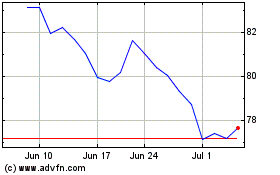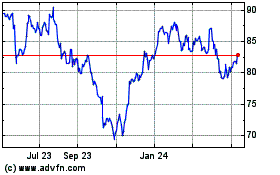FDA Approves Medtronic Pacemaker That Attaches Directly to Heart -- Update
April 06 2016 - 9:04PM
Dow Jones News
By Jeanne Whalen
The U.S. Food and Drug Administration approved a new pacemaker
for the heart that doesn't require the use of wires that can
sometimes cause complications.
The inch-long device from Medtronic PLC, called Micra, uses
small prongs to attach directly to the heart, where it delivers
electrical pulses that help the heart beat more regularly. Older
pacemaker devices are implanted under the skin near the collarbone
and are hooked to the heart by one or more wires that are fed
through the veins.
Those wires, sometimes called leads, can break or grow infected,
causing complications and the need for extra procedures.
"As the first leadless pacemaker, Micra offers a new option for
patients considering a single chamber pacemaker device, which may
help prevent problems associated with the wired leads," William
Maisel, acting director of the Office of Device Evaluation at the
FDA's Center for Devices and Radiological Health, said in a
statement.
The FDA said Micra is intended for patients with irregular
heartbeats such as atrial fibrillation or bradycardia-tachycardia
syndrome.
In a clinical trial funded by Medtronic and published last year
in the New England Journal of Medicine, 725 patients were implanted
with a Micra device. After six months about 98% of them had
adequate heart pacing. According to the paper, there were major
complications in 25 patients, including cardiac injuries and blood
clots.
No patients in the study received older pacemakers for the sake
of comparison. After the study was completed the researchers
compared the Micra's rates of complication with those of older
pacemakers in other studies and found that Micra patients had
"significantly fewer major complications," according to the study
results.
The Micra is implanted through a thin tube inserted in a vein in
the patient's groin. The vein leads to the heart, where the
pacemaker is affixed to the inside of the right ventricle of the
heart. The Micra paces only the lower chambers of the heart and is
therefore not suited for all patients, some of whom need pacing in
the upper and lower chambers, according to John Hummel, a
cardiologist and medical professor at Ohio State University who
helped conduct the trial published in the New England Journal of
Medicine.
He said other wireless pacemakers are being developed that would
work in the upper and lower chambers of the heart. The Micra
"represents the threshold of a future of leadless pacemakers," he
said.
Apoor Patel, a cardiologist at North Shore University Hospital
in New York, a unit of Northwell Health, said he is optimistic the
Micra can "reduce some of the complications associated with
traditional devices."
In a statement, Medtronic said it was pleased "to be the first
to introduce a transcatheter pacemaker to patients in the U.S."
The device received the CE Mark in Europe a year ago.
On March 1, Medtronic reported a 12% growth in net income in its
fiscal third quarter, while a strong U.S. dollar and
weaker-than-expected sales of some products pressured the company's
revenue and operating margins.
The earnings report was the fourth since the $43 billion
purchase of Covidien in an inversion deal.
On Wednesday, after proposed regulations on inversions led to
the collapse of Pfizer Inc.'s planned $150 billion deal with
Allergan PLC, Medtronic said the regulations won't have a material
financial impact on the company.
Josh Beckerman contributed to this article.
Write to Jeanne Whalen at jeanne.whalen@wsj.com
(END) Dow Jones Newswires
April 06, 2016 20:49 ET (00:49 GMT)
Copyright (c) 2016 Dow Jones & Company, Inc.
Medtronic (NYSE:MDT)
Historical Stock Chart
From Mar 2024 to Apr 2024

Medtronic (NYSE:MDT)
Historical Stock Chart
From Apr 2023 to Apr 2024
